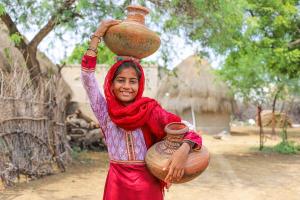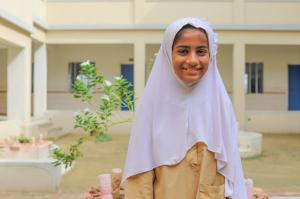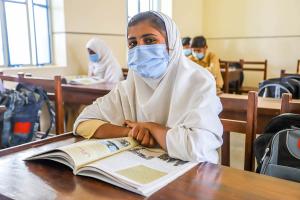The Citizens Foundation Celebrates the U.N. International Day of the Girl Child
Since its formation in 1995, TCF has championed the rights of girls in Pakistan for equal opportunity with boys in education.
The Citizens Foundation runs 1,687 schools in Pakistan’s most challenged communities with all-female teaching staff and focuses on enrollment and retention of girls in education.”
SAN FRANCISCO, CA, UNITED STATES, October 11, 2021 /EINPresswire.com/ -- The unique challenges faced by girls around the world are daunting. In 2011, the UN adopted a resolution to declare October 11 as the International Day of the Girl Child to bring attention to the dilemma of the female child for equal opportunity in education and acquiring of job skills—and, most important, for protection from predators. — TCF
The education programs of The Citizens Foundation (www.tcf.org.pk) are a testament to the fact that the empowerment of girls through quality education and work opportunities is rapidly gaining ground in Pakistan. With girls as nearly half (or 48%) of the 275,000 students enrolled in its 1,687 schools—and many of them moving on to university and well-paid jobs in the competitive open market, TCF has debunked the myth that poor parents are keeping their girls out of school. The truth is that when schools are made easily accessible for girls and their safety is ensured, parents are comfortable allowing their girls to get an education.
This may come as somewhat of a surprise but TCF—a Pakistani organization—is the largest education non-profit in the world with an enrollment of 275,000 students currently, virtually all of them from underprivileged families who would otherwise not be able to afford quality education for their children. TCF has ignited a soft revolution in the country by demonstrating that poor and often minimally educated parents do want their children to go to school, including the girls.
Admittedly, there is a long road to be traveled before true equality for women is achieved and Pakistani women feel free, liberated and protected as equal citizens. But despite the frequently gloomy picture painted in the (western) media, Pakistan does have a fairly good record of female emancipation, evidenced by numerous examples of women in political leadership* and professions typically dominated by men. The culture and acceptance of women in business and corporate management is going through rapid transformation and there are many more women in public and private governance positions than just a few decades ago.
*A reminder too that Pakistan has had a female prime minister (Benazir Bhutto) albeit one who rode on the coattails of her controversial father’s political dynasty. Nevertheless, the fact remains that, despite the conservative society, Pakistanis accepted a woman as a political leader and head of state—something even the USA continues to struggle with because of gender constraints and gender politics.
Since 1995, TCF has championed the rights of girls in Pakistan for equal opportunity in education with firm belief that girls have the potential to bring about societal change. The need is to effectively support girls during the growth years, giving them the opportunity to confidently grow into emerging roles as tomorrow’s workers, mothers, entrepreneurs, mentors, thinkers, policymakers, household heads, legislators, and political leaders. Girls from the poorest slums and rural communities are going on to university, becoming teachers, engineers, physicians, lawyers, – and joining the civil service, police force and defense services as officers. Quality education programs leading to professional careers—especially for girls—have helped families make the right choice and also preclude early marriages. Furthermore, by challenging the stereotypes often associated with poor education in the region, TCF works to advance the educational aspirations of young girls and boys and equip them with skills to join the modern workforce.
This emancipated role of girls is integral to the UN’s 2030 Agenda for Sustainable Development and each of its Sustainable Development Goals adopted in 2015. It is a powerful message and one that TCF celebrates today with the world, to promote the empowerment of girls and fulfillment of their human rights as equal citizens.
TCF was recently recognized as a 2021 Best Practice Honoree in the prestigious Library of Congress Literacy Awards for its community-based adult literacy program for women. The Aagahi program has allowed 150,000 adult women to gain basic literacy, numeracy, and everyday skills, elevating their self-confidence, dignity and engagement in the education of their own children.
As mentioned earlier, The Citizens Foundation runs 1,687 schools (including 357 adopted public schools) in Pakistan’s most underserved urban slums and rural towns and villages. Having an all-women teaching faculty significantly boosts the enrollment of girls and their retention as it gives the much-needed assurance to parents that the girls are safe in these schools. All the principals are also women. Collectively, there are 13,000 women teachers employed by TCF in its large network.
Incredibly, TCF is also the largest private employer of women in the country. In addition to the 13,000 teachers and principals, many more women work in TCF departments to do with strategic planning, academics, quality assurance, monitoring and evaluation of teachers, curriculum development, and marketing.
TCF schools are not free or ‘charity’ schools, but the tuition and operating costs are heavily subsidized by donors and foundation grants. A sliding scale fee structure offers affordability even to the poorest of the poor and the fees are waived entirely in deserving cases. The underlying emphasis remains on all children in the family attending school, including the girls.
It comes as no surprise that Pakistanis have generously supported TCF as a movement for change in the education environment. Half the TCF program costs are raised as individual and corporate donations in Pakistan. The balance is supported by global donors mostly from the Pakistani diaspora in the US, the UK, Canada and the UAE.
As a measure of its enormous impact, more than 55,000 girls and boys have graduated from TCF schools since inception, and more than 90% have continued to college. Currently, an astonishing 71% of alumni are employed or running their own enterprises, and 15% are enrolled in college or university. In this year alone, 1,000 TCF school grads were accepted at tier-1 and tier-2 universities and will undoubtedly pursue their professional aspirations.
TCF is a Pakistani success story worthy of the International Day of the Girl Child. It is a shining beacon to countries in the region that seek to diminish the rights of girls for equal opportunity in education.
David Gardner
DG Media
+1 310-433-2392
david@davidgardnermedia.com



